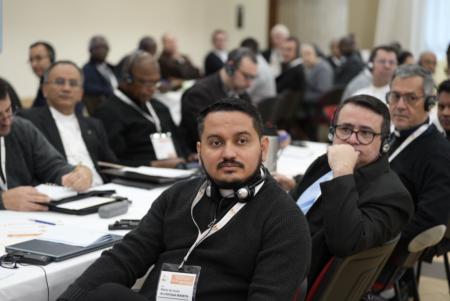Someone to sing about
I love Christmas carols -- just about everybody does. And while some might argue that by the time Christmas comes they’ve overdosed on fa-la-la’s, there’s something wonderful about knowing that every song you’ll hear when you’re out and around will be happy or beautiful or otherwise touching. At least for a few weeks every year, the general atmosphere is free of lyrics about unrequited love, lust, violence, lust, disillusionment, and did I mention lust? For a time, we sing about all the right things in life: giving, loving, God, angels, and the Holy Child of Bethlehem who brings hope to the whole world.
I have warm childhood memories of neighborhood caroling on dark, wintry nights. Snow crunching underfoot as stars beamed overhead: it was almost magical. Is there anything better to take away the cold than hot chocolate with marshmallows?
Caroling wasn’t a major undertaking. It was easy to find little booklets with Christmas carol lyrics. John Hancock Insurance Company used to print them, as did some local banks. It was also easy to find plenty of willing carolers. People were happy to sing together, and they all knew the songs. Almost everyone could carry a tune, and many would add harmonies by ear. Carolers were always greeted at the door with smiles from the residents inside. We’d usually sing two carols at each house, and end with a chorus of “We Wish You A Merry Christmas.”
When I was a kid, we learned traditional carols in public schools to sing at annual Christmas concerts. There was always a pretty even mix between religious and more secular songs, and one or two selections honoring Chanukah were routinely included.
My, how things have changed! Now, school music programs -- if there are any left -- seek to avoid any issues that may arise from even mentioning Jesus. There isn’t much “merry” about Christmas any more. Winter Vacation, Season’s Greetings, and Happy Holidays have taken its place. Even the word “Christmas” has become taboo in some circles.
I don’t think today’s parents and grandparents are entirely aware of what has become a rather open cultural hostility towards Christmas, and all things Christian. Christmas carols have taken a particularly hard hit. At this point, kids will never learn them if families and religious education programs don’t step in to teach them. Moreover, they won’t know the difference between a song like “Frosty the Snowman” and “Joy to the World” -- they may not even know that there is a difference. The fact is that our parishes have a lot of adults who don’t know the even the most basic Christmas carol repertoire, and who are uncomfortable singing much of anything at all. That’s a sad commentary on where we are these days. It’s also a confirmation of just how necessary it is for our churches to do everything in our power to foster a counterculture that affirms our faith.
Christmas carols are more than just pretty songs. They are perhaps one of the strongest avenues for evangelization now open to us. When we sing traditional songs about the birth of Jesus we learn a great deal about Him. We call Him “Word of the Father,” a “Holy Infant,” a “newborn King.” We are exhorted to “fall on our knees,” and invited to “come, let us adore Him.” We recall the fear of shepherds, the gifts of wise men, the “Little Town” in which He was born. We imagine the baby “away in a manger,” and hear the Virgin Mary “sing her lullaby.” At the very least we know what Christmas is all about. We become familiar with the Christmas story, the settings, characters, and events that make up the basic story line that many of us take for granted.
We’re used to cheering at sporting events, applauding great performances, and ooh-ing and ahh-ing over beautiful works of art. Christmas carols (and hymns) give us the chance to do the same for the great and wonderful God who loved us enough to send Jesus, his only-begotten son, into the world to save us. I think people won’t sing when they don’t have anything to sing about. It takes a special occasion or a special love to make us want to raise our voices in song.
After all is said and done, Jesus is not only someone to sing about -- he is the best someone to sing for. Sure, a few choruses of “Silent Night” may not change the world but music does have the power to reach into the human soul. Who knows? Perhaps singing about Jesus can lead us to something even greater: singing to Jesus, not only with our voices, but with our lives. Thank God there is a promised day when the whole world will “send back the song which now the angels sing.”
Jaymie Stuart Wolfe is a wife and mother of eight children, and a disciple of the spirituality of St. Francis de Sales. She is an author, speaker, musician and serves as Faith Formation Coordinator at St. Maria Goretti Parish in Lynnfield.



















